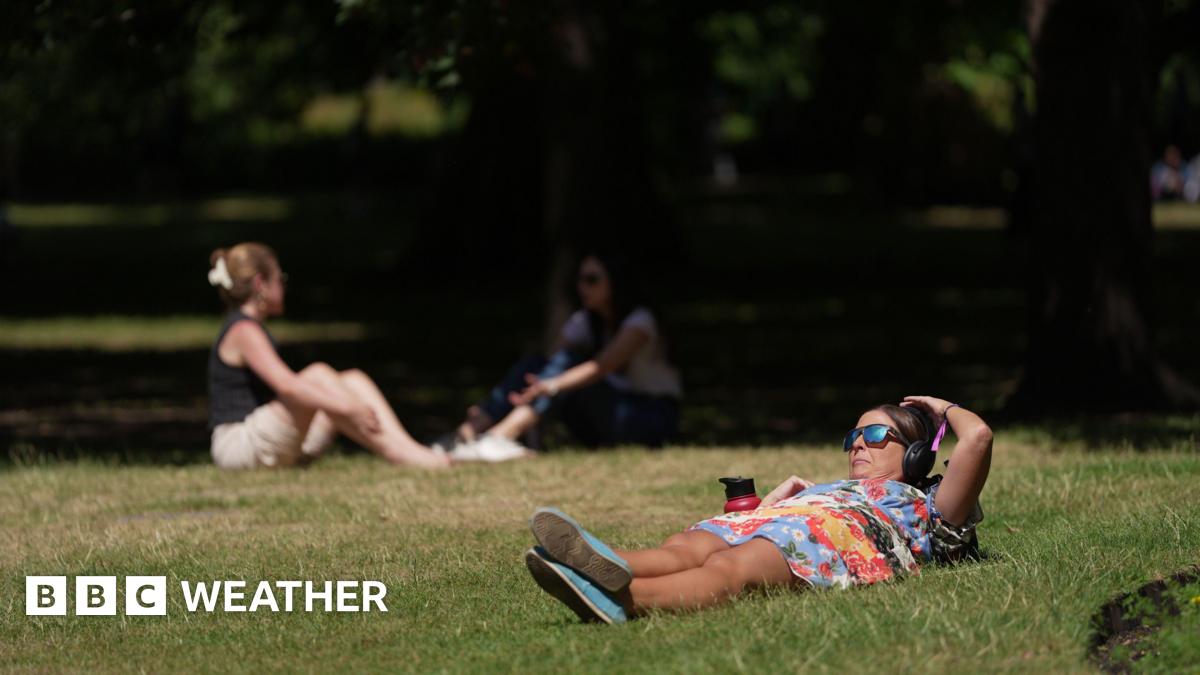Heatwave to peak this weekend as temperatures soar to 34C
- BBC News
The UK is seeing its third heatwave this year
Temperatures are forecast to increase across the UK over the next few days - reaching above the official heatwave threshold in some places for the third time this year.
Highs of 34C are likely on Friday and possibly Saturday, with the sweltering temperatures continuing into early next week.
The UK Health Security Agency (UKHSA) has extended yellow heat health alerts to cover every region in England, which will remain in place until 10:00 BST on Tuesday 15 July.
The warnings mean that health and social care services could be significantly affected by the weather – through increased demand or a rise in deaths.
Yellow alerts are less serious than the UKHSAs amber alerts, which were issued during previous spells of hot weather this year.
Organisations including the Alzheimers Society have issued advice on how to keep people safe in the heat.
The charity reiterated warnings that high temperatures can lead to severe health problems for those with dementia.
South-east Wales, central southern and south-east England will likely see the hottest weather with temperatures on Friday, up to 33C forecast.
However, all parts of the UK should expect hotter weather.
It could even be Wales hottest day of the year so far if the temperature exceeds 30.8C as forecast.
The Scottish Fire and Rescue Service has an "extreme wildfire warning" in place from Friday until Monday, covering different parts of the country across the weekend.
It is urging the public to "think twice" before using anything involving a naked flame. Firefighters in Scotland have had to tackle a number of wildfires during recent warm periods.
This heatwaves peak is unlikely to exceed the UKs highest temperature of the year so far, when 35.8C was reached on 1 July in Faversham, Kent, during the last heatwave.
The Met Office defines a heatwave as when a temperature threshold - which varies by region - being reached or exceeded for at least three consecutive days.
After the hottest opening day to Wimbledon on record, the finals over the weekend will also see temperatures in the low thirties
Saturday will be another hot and sunny day for most with temperatures in the high twenties and low thirties.
Highs of 33-34C have been forecast in the Midlands, east Wales and parts of central-southern England on Saturday.
Wimbledons finals in London over the weekend will see temperatures exceeding 30C.
The tennis tournament recorded its hottest opening day (32.2C) this year, but will likely fall just short of the hottest finals day, of 34.1C in 1976.
By Sunday, a cooler north-easterly breeze will develop, shifting the hottest weather into more central areas of England and eastern Wales, before a likely end to the heatwave on Monday or Tuesday.
England has also seen its driest start to the year since 1976, a report from the Environment Agency said.
Reservoir levels fell at nearly three-quarters of sites in June and are below average in all regions.
Yorkshire Water said a hosepipe ban for households will be in place to protect water supplies over the coming weeks.
Watering gardens, cleaning cars, filling paddling pools and other activities using hosepipes will be restricted in the region from Friday.
Meanwhile, the Liberal Democrats called on the Government to open "cool hubs" in public spaces with air conditioning, such as gyms, leisure centres and libraries.
"Cool hubs could provide a lifeline to the most vulnerable in our communities who are struggling in the sweltering conditions," said the partys energy spokesperson Pippa Heylings.
Tuesday should see the UK temperatures fall below the heatwave threshold
Comparing heatwaves is difficult because they are location dependant and the current Met Office definition has only been in place since 2019.
A heatwave occurring at some point during the summer is fairly common.
The last time the UK experienced three heatwaves was in 2022, when the highest temperature on record - 40.3C - was observed at Coningsby.
In terms of the number of heatwave days - when at least one location meets the temperature threshold - there have been 25 days so far in 2025.
Only in 1989 and 2018 were there more heatwave days by this point in the year - with 26 and 34 days, respectively, according to data from weather website Starlings Roost Weather, external.
Temperatures over the next few days will be around 7-10C above average for mid-July.
While linking climate change with specific individual extreme weather events can be difficult, scientists say climate change is generally making heatwaves hotter, longer and more frequent.
The head of conservation at the Bedfordshire, Cambridgeshire and Northamptonshire Wildlife Trust, Matt Jackson, told BBC Breakfast the heat has both short- and long-term impacts on wildlife.
An immediate effect is wildlife patterns becoming out of step, he said.
"We get the butterflies which feed the birds, for instance, coming out [at a time that is] out of sync with the bird breeding cycle - so they dont have the amount of food they need to feed their chicks."
However, drought is the "biggest threat" to nature reserve management in the long term, Mr Jackson added.
"It is changing the way our nature reserves work and were having to try and work out how to adapt to that."
Heatwaves: The New Normal?
How hot is too hot? From heat labs to firefighting helicopter pilots and wineries, this is a look at how extreme heat impacts people and environments in the UK.